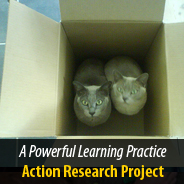The Haverford School
Team Members: Jay Brown (team leader), Ron Duska, Carol Ann Luongo, Cheryl Joloza, Deb Gavin, Sarah Barton
Community: ADViS Year 1, 2010-2011
The Haverford Lower School team discussed in September how our goal was to “think WAY outside the box” by using technology in completely new ways to support learning. We all had high hopes for “pie in the sky” support, but what we encountered were many roadblocks to access and funding that we assumed would be available. During the school year we attempted to use 21st century technology with some success, and a fair amount of frustration. In the end, we developed some ideas around “How can 21st century technology tools help us be a more effective learners?” This effort was based on our team’s dreams for the future.
About Action Research Projects
Action research is a process in which Powerful Learning Team members collaboratively examine their own educational practice systematically and carefully. Action research is:
- Disciplined inquiry into a problem or possibility within the school or classroom
- Collaborative and usually takes place in a community of practice
- Meaningful, positive, and reflective
- Data-driven, action-based, improvement-focused
- Transformative
Latest posts by Powerful Learning Practice (see all)
- Hurry, you do not want to miss out on this… - November 3, 2020
- Resist the Urge to Quit Prematurely - October 26, 2020
- Let’s Move Past Feeling Disconnected from Your Students. Words Matter - October 24, 2020


It’s going to be end of mine day, but before ending I am reading this impressive paragraph to improve my knowledge.